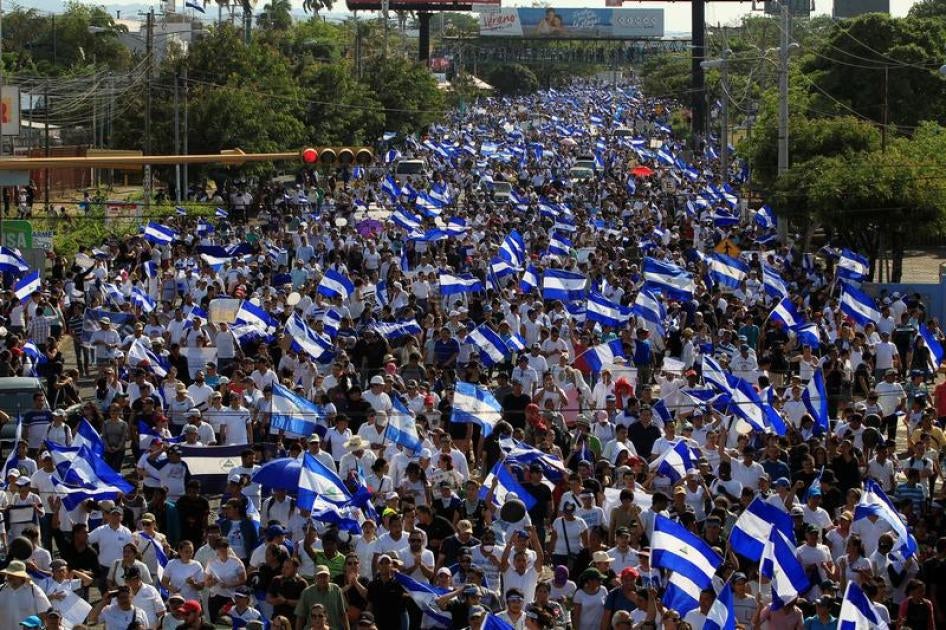The government of President Daniel Ortega of Nicaragua has promised its people the “truth” about who killed and injured scores of protesters who took to the streets last month. But his government seems to be determined to deliver just the opposite.
Since April, thousands of Nicaraguans have taken to the streets to protest Ortega’s 11-year administration. Credible accounts suggest that police officers used excessive force to shut down demonstrations, while pro-government groups attacked peaceful protesters and journalists. In some cases, police allegedly beat protesters in their custody. In all, 47 people have died, including two police officers. At least 435 people have been injured.
The government has repeatedly blamed protesters for the violence, while ignoring abuses by the police. On April 19, Vice President Rosario Murillo, who is also Ortega’s wife, accused “toxic” protesters of engaging in “attacks against peace and development.” The government, she said, was “making a huge effort” to ensure “harmony” and “non-violence.”
Many in Nicaragua have demanded a visit by the Inter-American Commission of Human Rights (IACHR), the main rights body in the Americas, to investigate what has taken place. The government denied the request. Instead, on April 27, in an apparent attempt to appease protesters, Ortega’s right hand in Congress, Gustavo Porras, announced the creation of a truth commission.
The move brings to mind a similar one by President Nicolas Maduro of Venezuela, a close ally of Ortega, who in 2017 created a “truth commission” to investigate “political violence” in Venezuela. Despite overwhelming evidence that security forces had engaged in systematic abuses against protesters, including killings and torture, the commission concluded in September that “the actions of security forces [were] beyond reproach.”
Indeed, it will hardly be a surprise to anyone if Nicaragua’s “truth” commission concludes that the government is entirely blameless, and that the protesters are the real villains.
On May 6, a board of seven lawmakers – five of whom belong to Ortega’s party – picked the commission’s five members. That same day, Ortega’s majority in Congress ratified their appointment. All the commission’s members have close ties to the ruling party, which seriously undermines any appearance of impartiality.
Adolfo Jarquín Ortel, for example, is the country’s deputy commissioner for human rights. In 2010 his term ended but, in a move that many described as unconstitutional, President Ortega issued a decree extending it. In July 2017, Ortel said on TV that Ortega’s government “respects and defends human rights,” and accused critics of being “enemies” of the ruling party.
Similarly, Father Uriel Molina has long been a supporter of Ortega. On February 21, he said that people in Nicaragua “owed” the “advantages in this country” to the revolutionary ideals that “live on in Commander Ortega and his wife Rosario Murillo.” Jaime López Lowery, for his part, is deputy dean of a public university in Managua, where he leads a group of pro-government students called the “Sandinista Leadership Council.”
Worse yet, the norms regulating the commission provides little reason to believe it will serve as anything more than a facade. It omits basic provisions needed for any truth commission to work. It fails to clarify how the commission will carry out its investigation, and whether public officials will be required to cooperate.
In an apparent effort to disguise these obvious weaknesses, on May 10, Jarquín Ortel announced that they had requested the “cooperation” of the Inter-American Commission. The rights body did not fall into the trap and, instead, it asked to visit the country to conduct its own investigation before deciding whether it would cooperate with the new entity. Unless it is allowed to visit the country with the government’s full collaboration, the Inter-American Commission should not engage in any “cooperation” that allows Nicaragua to burnish the image of its “truth commission.”
When the first deaths were reported in April, the governments of Argentina, Brazil, Colombia, Chile, Paraguay, and Peru – member countries of the Organization of American States (OAS) – expressed their “solidarity” with the protesters who lost their lives. But they can and should do much more. They should promptly convene a meeting of the OAS Permanent Council, with ambassadors of all the member countries, to denounce the lack of credibility of Ortega’s “truth commission” and press him to allow the Inter-American Commission to visit the country.
This article was published on El País before Nicaragua accepted the request of the Inter-American Commission on Human Rights to visit the country.









